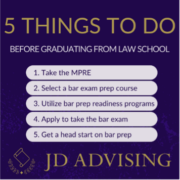How to Study Sample MEE answers
 How to Study Sample MEE answers: An important aspect of studying for the MEE (Multistate Essay Exam) is thoroughly reviewing the Bar Examiners’ Analyses (MEE Sample Answers) for each question you answer or outline. You can access the essay questions and corresponding Analyses from 2006 through February 2011 for free on the NCBE website. Analyses for recent exams (July 2011 – present) are included along with your purchase of MEEs on the NCBE website. Keep in mind that the Analyses were written by the bar examiners, not students. You are not expected to reproduce such answers on exam day! So do not panic when you read them. Below are some tips to help you effectively review the MEE Analyses.
How to Study Sample MEE answers: An important aspect of studying for the MEE (Multistate Essay Exam) is thoroughly reviewing the Bar Examiners’ Analyses (MEE Sample Answers) for each question you answer or outline. You can access the essay questions and corresponding Analyses from 2006 through February 2011 for free on the NCBE website. Analyses for recent exams (July 2011 – present) are included along with your purchase of MEEs on the NCBE website. Keep in mind that the Analyses were written by the bar examiners, not students. You are not expected to reproduce such answers on exam day! So do not panic when you read them. Below are some tips to help you effectively review the MEE Analyses.
How to Study Sample MEE Answers
1. Pay attention to the legal issues outlined on the first page.
The overarching legal issues that you should have spotted are outlined briefly at the beginning of the MEE Analysis. See whether you identified the same issues (they don’t have to be stated as eloquently!). Check to see whether you missed any nuances of the issues that the examiners highlighted. For example, the Trusts and Future Interests Analysis for the February 2011 question highlighted the following legal problems for discussion:
- Does a creditor of a beneficiary of a discretionary trust have the right to compel the trustee to make payments to the creditor?
- When an income beneficiary of a testamentary trust adopts a child after the testator’s death, does the adopted child qualify as a “grandchild” for purposes of sharing in a trust remainder?
- In a class gift to grandchildren following the death of a life tenant, does the class close upon the life tenant’s death when there is a grandchild eligible to take, even though more grandchildren could be born after that date?
- When a trust instrument creates a remainder in “grandchildren, with the children of any deceased grandchild taking the deceased parent’s share,” does any interest vest in the estate of a grandchild who dies without issue before the remainder becomes possessory?
As you review the MEE sample answer, write or type any issues you missed in your own answer in a different color. If there are any legal terms you are unsure of, read the Analysis carefully to see how they are defined. When you look at all of the essays you practiced for a particular subject you will quickly see which issues you missed and how the issues fit into the larger picture.
2. Pay attention to the elements of the each rule.
See whether you accurately stated the rules. For example, the Trusts and Future Interests Analysis for the February 2011 question included this rule regarding the distribution of a class gift: “A class gift closes to future entrants when at least one class member is entitled to distribution.” If you did not know this was the rule or if you misstated it, write or type out the rule in your own answer in a different color.
This is so you can come back to your answer, quickly review it, and see what you missed the last time. It draws attention to what you do not know. This will help you to improve your answers over time.
Sometimes, the rule statements are longer than one sentence. If this is the case, do not worry about writing the exact rule. Rather, see whether you included the main points of the rule in your answer. No one can memorize all the nuances for every rule. It is important, however, to include the nuances of the most highly tested areas of law for a particular subject. For example, you should be familiar with the business judgment rule in corporations and when it does/does not apply.
3. Pay attention when multiple approaches are included.
The MEE Analyses don’t always discuss multiple approaches to a legal issue. Therefore, if they do take the time to discuss any, include them in your answer as you are editing. For example, if you come across the issue of disclaimer in a Decedents’ Estates question, you will see that the examiners usually discuss both the Uniform Probate Code and common law approaches.
Remember that the Uniform Bar Exam does not test the law of a particular state, but rather the approaches that jurisdictions across the country use with respect to a specific legal issue.
4. Pay attention to how the facts are incorporated in the Analysis.
Often students miss out on valuable points because they write conclusory statements. Sometimes they choose to paraphrase the facts and miss subtleties in the fact pattern. Pay attention to how the facts are incorporated, how any ambiguities are discussed, and when the Analysis notes that students could come out either way on an issue (as long as it’s well reasoned). When you self-grade your response, write down any relevant facts that your forgot to include.
5. Do not worry too much about restatement sections, case names, or citations.
As a general rule, don’t worry about including case names or restatements from the Analyses in your response. However, it is a good idea to include the case name if you are referring to a particular test or standard that derives its name from a case (e.g. Miranda, or Washington v. Crawford). There’s no need to include citations – this is not a law review note! Focus on answering the call of the question and using IRAC to organize your answer.
Looking to Pass the Bar Exam?
Free Resources:
- 🌟Bar Exam Free Resource Center: Access our most popular free guides, webinars, and resources to set you on the path to success.
- Free Bar Exam Guides: Expert advice on the MBE, the MEE, passing strategies, and overcoming failure.
- Free Webinars: Get insight from top bar exam experts to ace your preparation.
Paid Resources:
- 🏆One-Sheets: Our most popular product! Master the Bar Exam with these five-star rated essentials.
- Bar Exam Outlines: Our comprehensive and condensed bar exam outlines present key information in an organized, easy-to-digest layout.
- Exclusive Mastery Classes: Dive deep into highly tested areas of the MBE, MEE, MPT, and CA bar exams in these live, one-time events.
- Specialized Private Tutoring: With years of experience under our belt, our experts provide personalized guidance to ensure you excel.
- Bar Exam Courses: On Demand and Premium options tailored to your needs.
- Bar Exam Crash Course + Mini Outlines: A great review of the topics you need to know!
🔥 NEW! Check out our Repeat Taker Bar Exam Course and our new premier Guarantee Pass Program!



